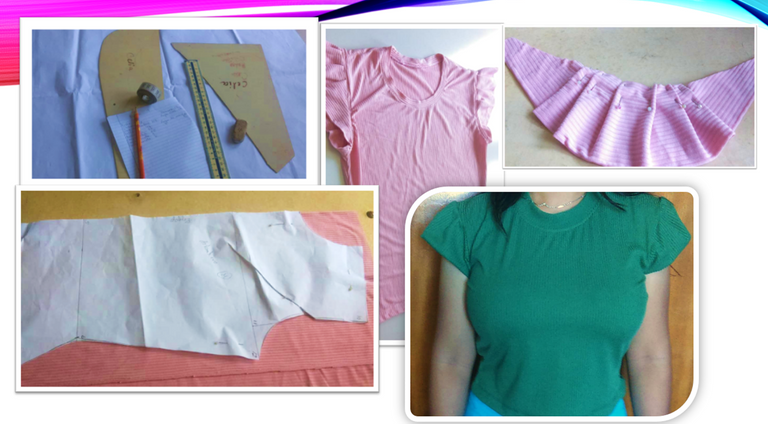
También quiero recordarles que aprovechen cada momento de compartir con su familia, incluso pueden trabajar con su familia y así se disfruta mucho más el trabajo, como hago con mi bella nieta @chrisscoronado.
Hoy les traigo cómo elaborar de manera sencilla unas hermosas blusas juveniles talla M.
MATERIALES
• 50 cm de Microrib
• Hilo
• Tijeras
• Alfileres
• Maquinas
I also want to remind you to take advantage of every moment to share with your family, you can even work with your family and enjoy the work much more, as I do with my beautiful granddaughter @chrisscoronado.
Today I bring you how to make in a simple way some beautiful youth blouses size M..
MATERIALS
- 50 cm of Microrib
- Yarn
- Scissors
- Pins
- Machine
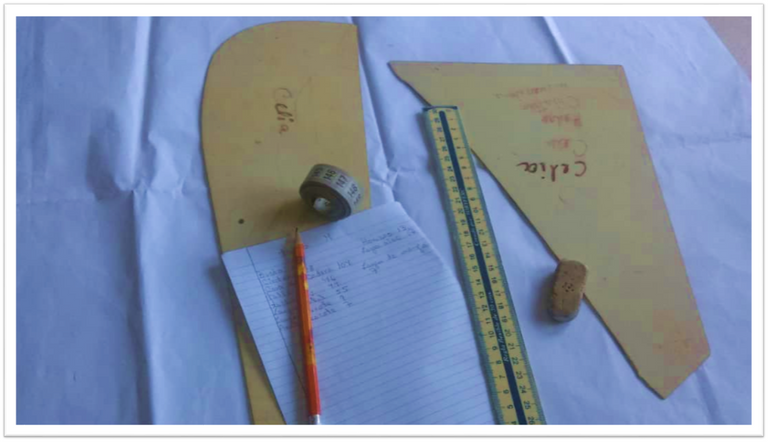
PARTE DELANTERA
1- Trazamos un rectángulo que mida de ancho una cuarta parte del busto y el largo la blusa, y colocamos los puntos 1-2-3-4.
2- Desde el punto 1 hacia abajo marcamos el largo del talle delantero y colocamos el punto 5, trazar línea recta, sobre esta marcamos el contorno de cintura, obteniendo el punto 6.
3- Desde el punto 1 marcamos el punto 7 (largo de escote) y el 8 (ancho de escote).
4- Desde el 8 marcamos el punto 9 (largo hombro)
5- Del 9 hacia abajo marcamos caída de hombro 3 cm y obtenemos el punto 10
6- Desde el punto 10 hacia abajo marcamos el largo de sisa 17 y obtenemos el punto 11, desde el punto 11 la distancia que queda en la recta marcamos el punto 12.
7- Buscamos punto½ en esta recta, y marcamos hacia adentro 1 cm y obtenemos el punto 13.
8- Unir con línea curva los puntos 10-13-12, el 12 y 6 con línea recta igualmente el 6 y 4 hacemos una pequeña curva en el punto 6 y 4, para tener mejor caída.
9- En esta blusa voy a hacer una corrección de sisa por el tipo de manga. En la linea media de la sisa se bajan 2 cm, trazamos una recta de 7 cm, inclinando hacia el punto de busto y trazar una pinza (solo para el delantero).
FRONT PART
1- We trace a rectangle measuring a quarter of the width of the bust and the length of the blouse, and place the stitches 1-2-3-4.
2- From point 1 downwards, mark the length of the front waistline and place point 5, draw a straight line, on this we mark the waist contour, obtaining point 6.
3- From point 1 we mark point 7 (neckline length) and 8 (neckline width).
4- From point 8 we mark point 9 (shoulder length).
5- From point 9 downwards, we mark the shoulder drop 3 cm and we obtain point 10.
6- From point 10 down we mark the armhole length 17 and we obtain point 11, from point 11 the distance left on the straight line we mark point 12.
7- Find point½ on this line, and mark inward 1 cm and we obtain point 13.
8- Join with a curved line the points 10-13-12, the 12 and 6 with a straight line and also the 6 and 4 we make a small curve in the point 6 and 4, to have a better drape.
9- On this blouse I am going to make an armhole correction due to the type of sleeve. In the middle line of the armhole we go down 2 cm, we draw a straight line of 7 cm, leaning towards the bust point and draw a pinch (only for the front).
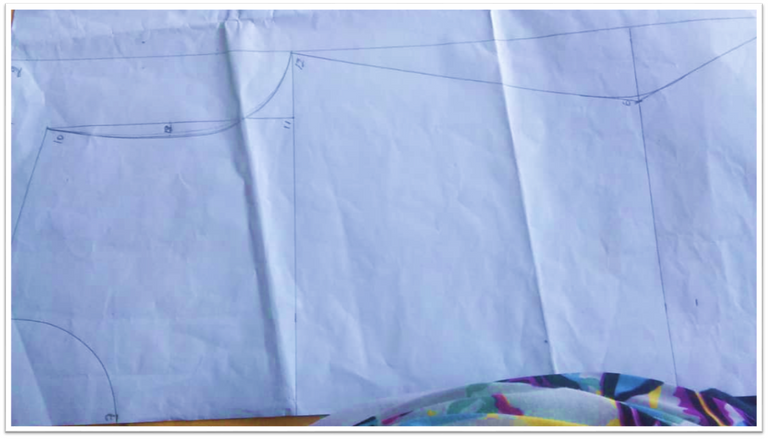
Trazado de la parte frontal del patrón.
Tracing the front of the pattern.
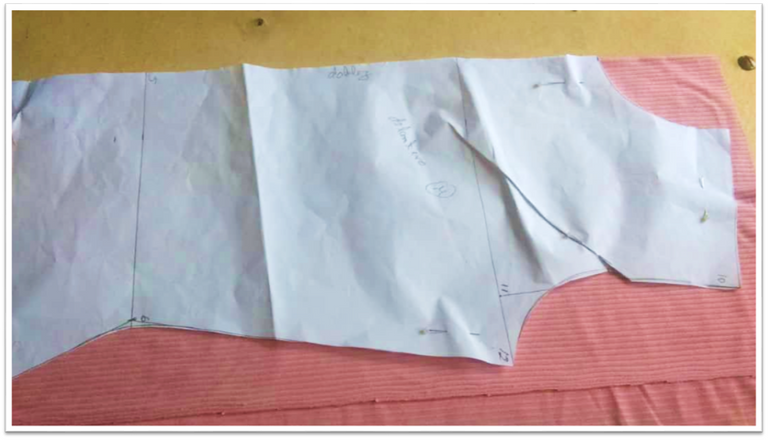
Uso del patrón frontal para cortar la tela.
Using the front pattern to cut the fabric.
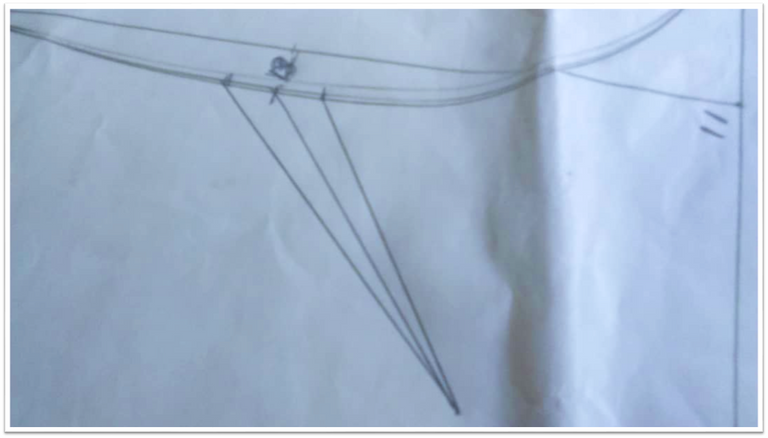
Patrón de corrección de sisa.
Armhole correction pattern.
PARTE TRASERA
Colocamos el patrón de la parte delantera sobre el papel y rectificamos el largo del escote 2 cm y el largo del talle trasero 42 cm, en este patrón no hacemos corrección de sisa.
NOTA: Para cortar la pieza delantera doblamos en la corrección de la sisa (no es necesario coserla)
BACK PART
We place the pattern of the front part on the paper and rectify the length of the neckline 2 cm and the length of the back waistline 42 cm, in this pattern we do not make armhole correction.
NOTE: To cut the front piece we fold in the armhole correction (no need to sew it).
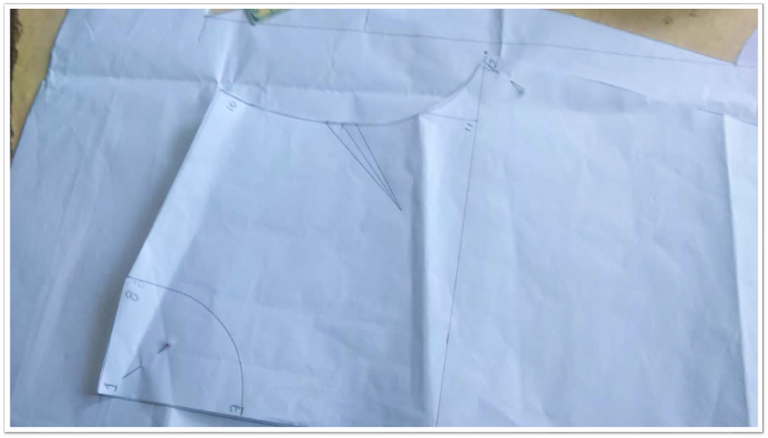
Trazado de la parte trasera del patrón.
Tracing the back of the pattern.
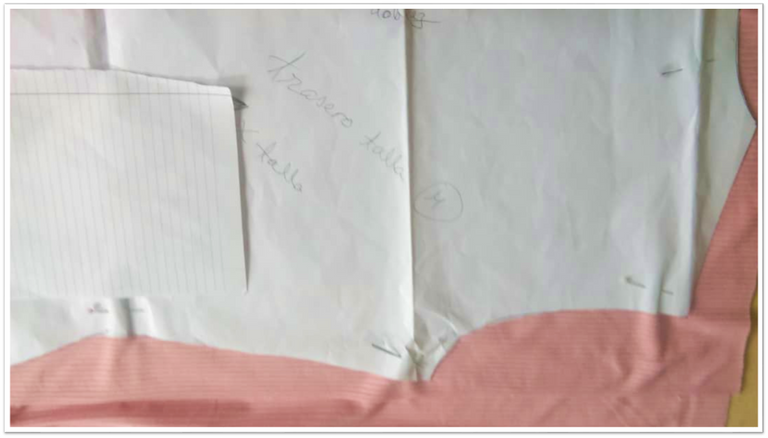
Uso del patrón trasero para cortar la tela.
Using the back pattern to cut the fabric.
MANGA
1- Trazamos una recta marcando el punto A en el ángulo superior izquierdo.
2- Del A bajamos el largo y fijamos el punto B, a la derecha marcamos el ancho de la manga o contorno de sisa fijando el punto C.
3- Del C bajamos caída de la manga (6) fijamos el punto D.
4- Del B a la derecha ancho de brazo (manga corta) punto E
5- Unimos con línea recta A-D, D y E
6- Hallamos la mitad de A-D y colocamos *, del * hacia arriba marcamos un cm y el punto F.
7- Unimos con curva suave hacia arriba A y F, y con curva suave hacia abajo F y D y con línea recta el D y E y el E con B
Este modelo de manga lo cortamos doble y con mayor largo para hacer pliegues.
SLEEVE
1- We draw a straight line marking point A in the upper left corner.
2- From A we go down the length and set point B, to the right we mark the sleeve width or armhole outline by setting point C.
3- From C we lower the sleeve drop (6) and fix point D.
4- From B to the right arm width (short sleeve) point E.
5- We join with a straight line A-D, D and E.
6- We find the middle of A-D and place *, from * upwards we mark a cm and point F.
7- We join with a smooth curve upwards A and F, and with a smooth curve downwards F and D and with a straight line the D and E and the E with B.
This sleeve model we cut it double and longer to make pleats.
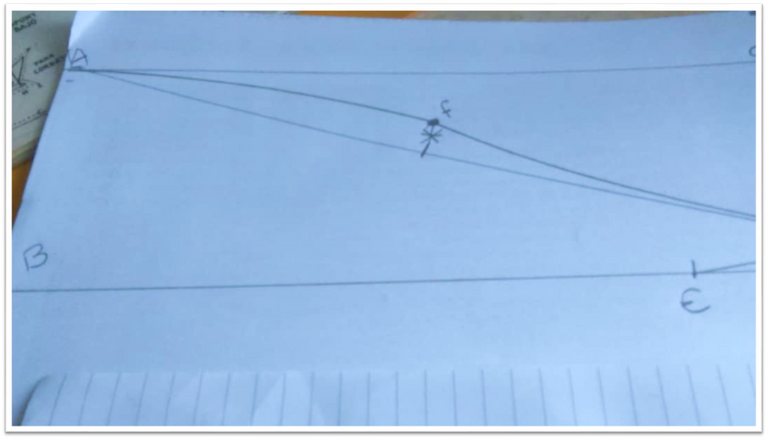
Trazado del patrón de la manga.
Tracing the sleeve pattern.
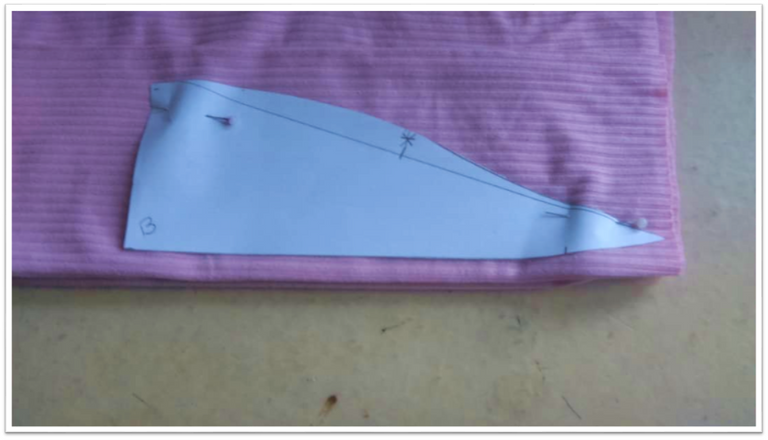
Corte de la manga utilizando el patrón.
Cutting the sleeve using the pattern.
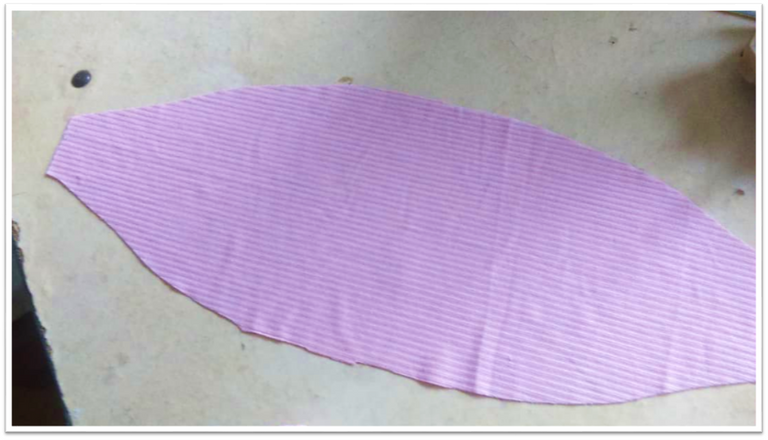
La manga cortada.
The cut sleeve.
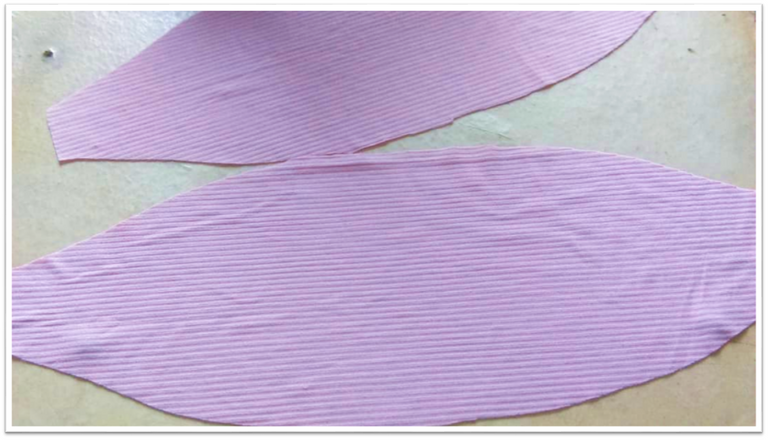
Las dos mangas ya cortadas.
The two sleeves already cut.
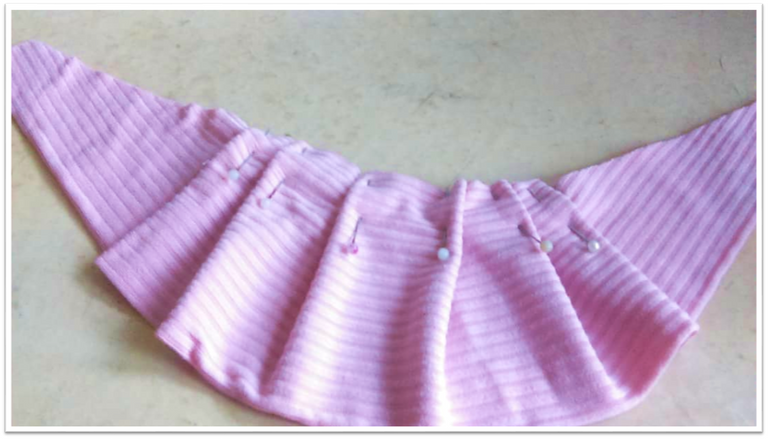
La manga con su pliegues sujetados por alfileres.
The sleeve with its folds pinned.
CUELLO
1- Lo dividimos en 4 partes iguales
2- Corto una tira que mida ¾ partes del contorno del cuello
3- Unirlo, dividirlo en 4 partes iguales.
4- Ir cosiendo estirando un poco para hacerlo coincidir las partes.
5- Repisar la costura por el lado externo.
NECK
1- We divide it into 4 equal parts
2- I cut a strip that measures ¾ parts of the neck contour.
3- Join it, divide it into 4 equal parts.
4- Sew stretching a little bit to make the parts match.
5- Refinish the seam on the outer side.
CONFECCIÓN
1- Unimos por el hombro.
2- Unir los costados.
3- Colocar las mangas.
4- Colocar una cinta al bies por el cuello.
5- Coser ruedo.
CONFECTION
1- Join the shoulder.
2- Join the sides.
3- Attach the sleeves.
4- Place a bias tape around the neck.
5- Sew the hem.
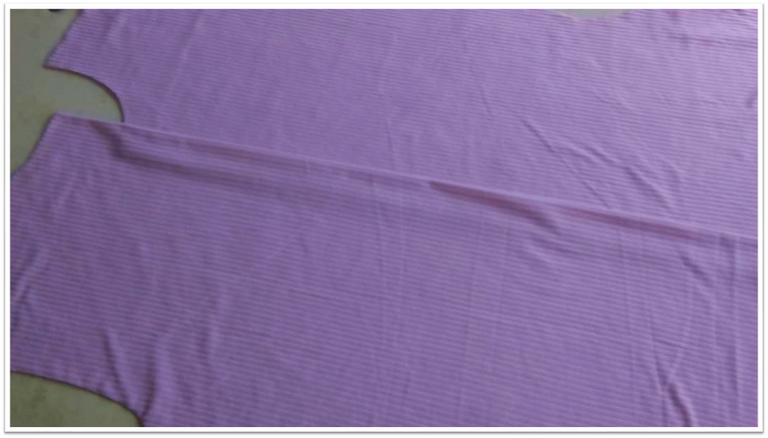
La pieza delantera y trasera juntas.
The front and back piece together.
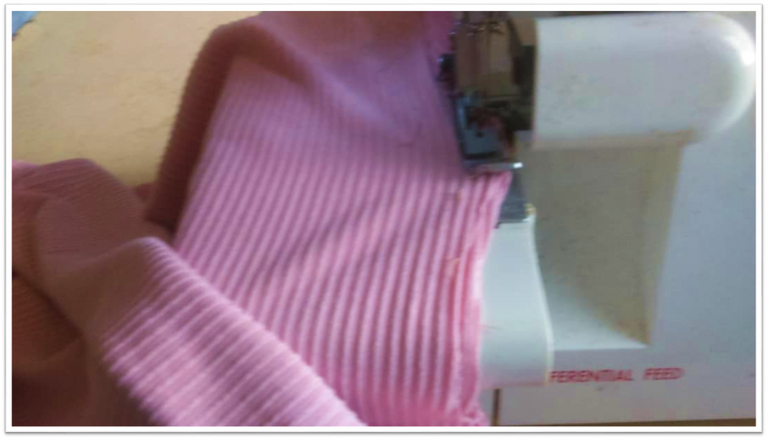
Uniendo las piezas.
Joining the pieces together.
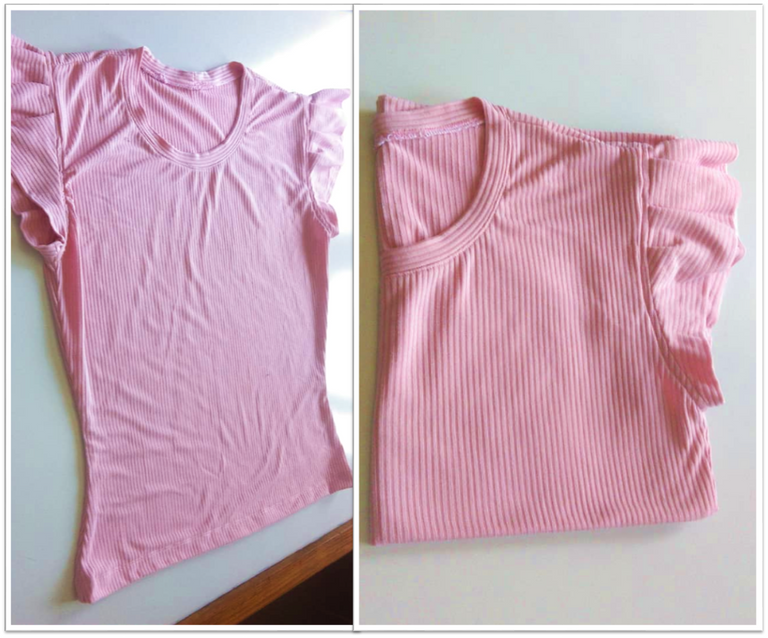
El resultado final. Puede ver el diseño de las mangas por los dobleces que le hicimos antes.
The final result. You can see the design of the sleeves because of the folds we made before.
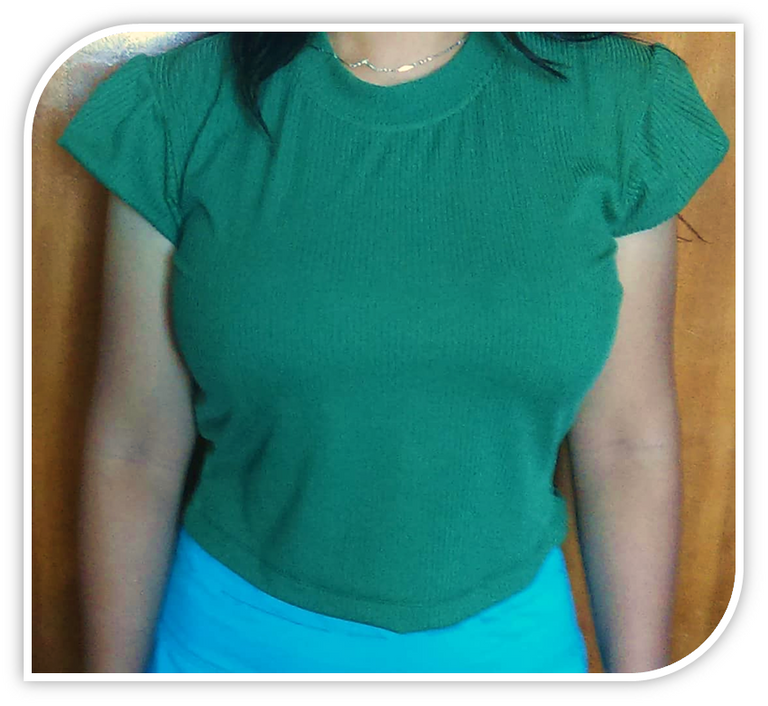
Este es el mismo diseño en otro color. La corrección de sisa sirve para entallar mejor la blusa en la zona de las axilas.
This is the same design in another color. The armhole correction serves to better fit the blouse in the armpit area.
Y eso ha sido todo por esta ocasión. Espero que puedan sacarle provecho a esta información y que aprovechen estos tiempos de trabajo para compartir con su familia.
Hasta una próxima puntada
And that's all for this occasion. I hope you can take advantage of this information and that you take advantage of these times of work to share with your family.
¡Hola Celia ❤️! Gracias por compartir el trazado del patrón y la confección de esta linda blusa, siempre es bueno saber y entender las medidas de las prendas para saber de dónde vienen 😃. ¡Gran trabajo!
Congratulations @abuelacosturas! You have completed the following achievement on the Hive blockchain and have been rewarded with new badge(s) :
Your next target is to reach 500 upvotes.
You can view your badges on your board and compare yourself to others in the Ranking
If you no longer want to receive notifications, reply to this comment with the word
STOPIt’s beautiful, well explained @abuelacosturas
Thanks. I'm glad you liked it :)
I'm always trying to teach to make clothes, so follow me and you won't lose any design/class :)